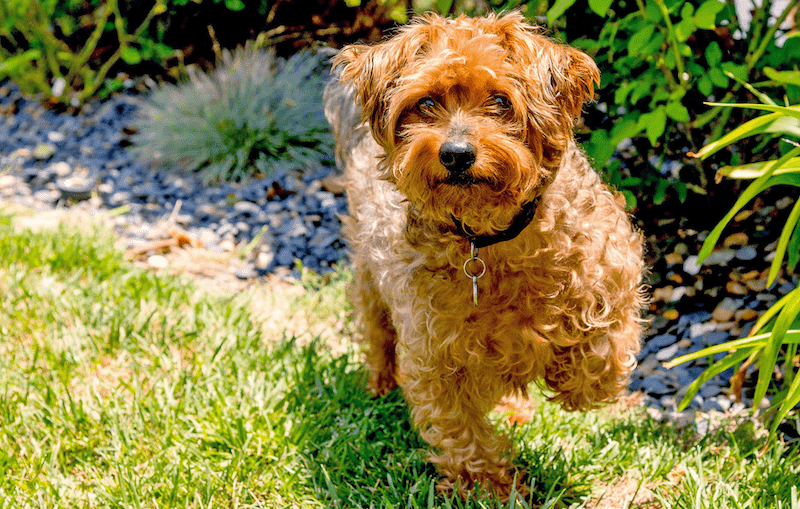Dogs
The In-Depth Yorkipoo Dog Breed Guide
Yorkipoo Dog Breed
The Yorkipoo (Yorkie, Yorki Poo) is a designer dog breed that is the result of crossing a Yorkshire Terrier with a Toy or Miniature Poodle.
They make great companions and even though they are a small dog, their personality is anything but!
With the right care and training they can make amazing pets.
If you’re considering adding a Yorkipoo to your family, this blog post will give you all the information you need about these social animals.
What is a Yorkipoo?
The Yorkipoo is a cross between a Yorkshire Terrier and Poodle. They are sometimes called a Yorkie Poo or Yoodle.
The Yorkipoo is typically bred using Toy Poodles. Sometimes Miniature Poodles are used.
However, breeders should not cross breed them using large dogs such as Standard Poodles. This helps to keep them small.
But where did the Yorkipoo come from? There were likely many accidental Yorkshire Terrier and Poodle crosses throughout history.
It is unclear when the first intentional Yorkipoo was created as no breeder recorded doing so or has stepped up claiming to be the first.
It was most likely sometime about a decade ago in the USA.
Since the early 2000’s, the popularity of Poodle hybrid breeds (affectionately known as ‘Oodle dogs’) has boomed.
Their breed group popularity is likely because the pups will inherit the Poodle parent’s good nature and hypoallergenic coat.
This stemmed from the Labradoodle being created in the 1980’s as a hypoallergenic guide dog.
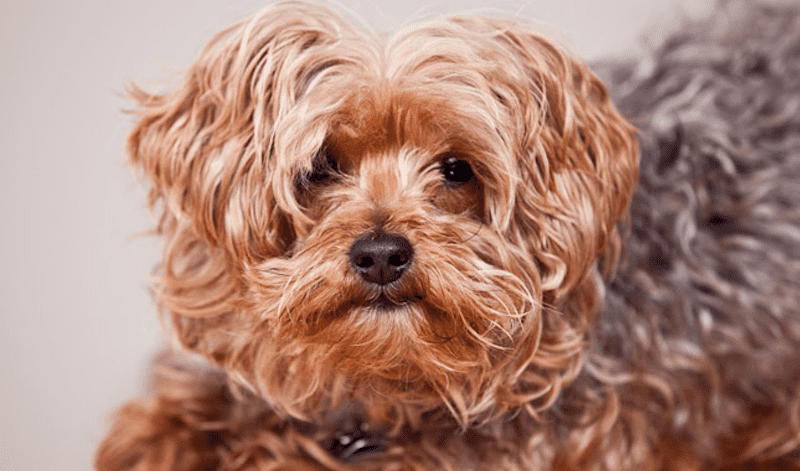
Most Yorkipoos are a first generation mix, meaning they have one Yorkshire Terrier parent and one Poodle parent.
More rarely the offspring are from two Yorkipoos (aka. multigenerational).
A first generation mix can mean the puppies’ temperament and appearance may be hard to predict.
It also means it is impossible to create an official breed group standard for them.
There are not many Yorkipoo breeders in Australia so they can be difficult for budding dog owners to find.
Yorkshire Terrier
The Yorkshire Terrier is a companion dog, more commonly known as a ‘Yorkie’. They are classed as being ‘teacup’ sized because they are so tiny.
They originated from the mining districts of Yorkshire County, in northern England. They were originally used to catch rats and other vermin.
Yorkies are a fun loving dog. They are suitable for apartment living because they are such small dogs that don’t need too much space.
If you plan on keeping your dog indoors, it is a good idea to make sure the Yorkshire Terrier gets a good amount of exercise and playtime.
Their life span is typically 12-16 years.
Physical Appearance
A huge reason Yorkipoos are popular is because they are so adorable! They are like living teddy bears.
When you look up Yorkipoos online, you may notice that their appearance varies greatly.
Like all hybrid breeds, their appearance can be hard to predict.
They may turn out looking more like a Yorkshire Terrier or more like a Poodle.
A good breeder will be able to show you photos of the parent dogs and previous puppies to give you an idea of what your Yorkipoo will look like.
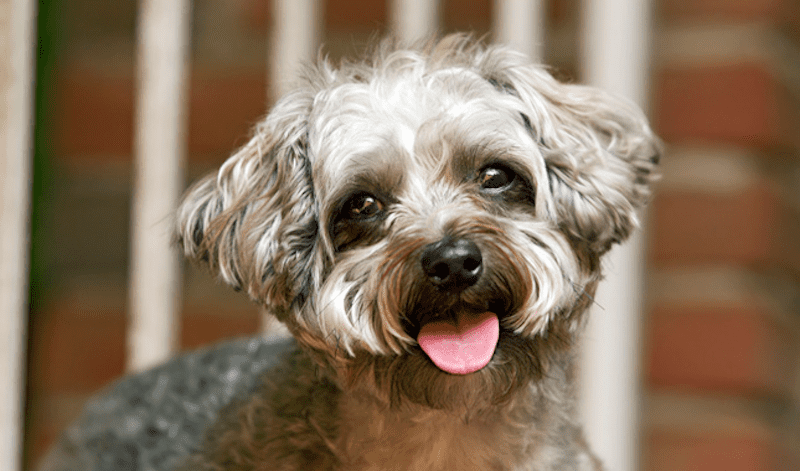
Their ears may be pointy and V-shaped like a Yorkshire Terrier or floppy ears like a Poodle.
If your Yorkipoo has floppy ears, it will be prone to ear infections. Make sure to keep their ears clean and dry.
Similarly, their snout may be longer like a Poodle or shorter like a Yorkshire Terrier. And they may have a Poodles long tail or a Yorkies short bob.
They will usually have dark brown eyes and wet black noses.
Sizes
People often ask how big their Yorkipoo will get. Because they are a mixed breed, it can vary greatly.
Your Yorkipoo will be small. Yorkshire Terriers are tiny and classified as ‘teacup’ size.
The average Yorkipoo is crossed with a Toy Poodle which keeps them tiny.
They are usually only 16-25cm tall at their shoulder. They will weigh between 2.5-5.5kg.
If your Yorkipoo is crossed with a Miniature Poodle then it may be a little taller and heavier. But it will still be classed as a very small dog.
Their body shape may also vary. Some Yorkipoos will have very skinny legs and a narrow frame while others will be stockier.
Coat
As a designer breed, a Yorkipoo’s coat can differ.
They may have a silky coat like a Yorkshire Terrier. This will be soft, shiny, straight and grow very long (if left untrimmed).
Or they may have a Poodle’s coat. This will be coarser, thicker and very curly.
The typical Yorkipoo will have fur somewhere in between – soft but thick, in messy waves.
Coat Colours
A Yorkshire Terrier’s coat can come in black, blue, tan or gold.
They are rarely one solid colour but usually a combination of two or more colours with markings throughout.
A Poodle’s coat can come in a huge array of colours with the most common being black, white, brown, tan, silver, grey and cream.
Their coat is more commonly one block colour but they occasionally will have coloured markings.
The Yorkipoo can be any of these colours and typically has a Yorkshire Terrier’s bi-colour or tri-colour coat.
Are Yorkipoos Hypoallergenic?
Yes, Yorkipoos are hypoallergenic. This is because they have a Poodle’s coat, which sheds almost no hair.
This means that dog owners with mild allergies don’t react to them. Therefore, Yorkipoos and other Poodle mix breeds are also allergy friendly.
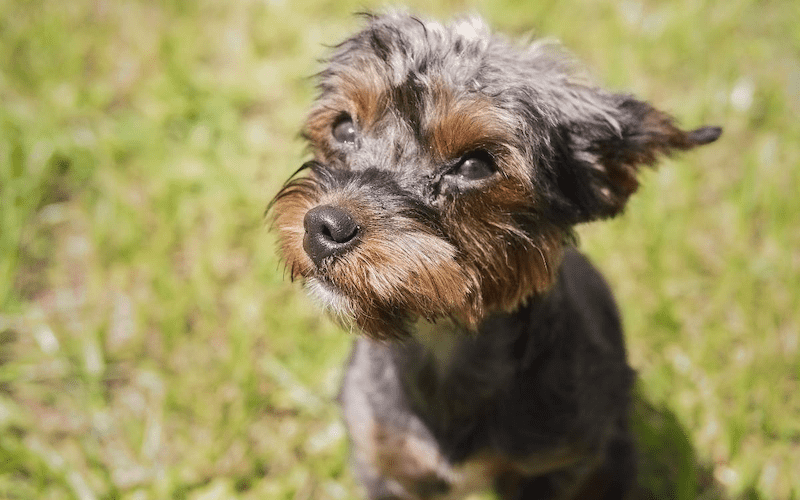
The more Poodle a Yorkipoo has in its lineage, the less fur it will shed and the more of a hypoallergenic dog it will be.
While the American Kennel Club and other similar organisations do not recognise the Yorkshire Terrier as hypoallergenic, many owners report they are as they also shed minimal hair.
It is important to note that no dog breed is a 100% hypoallergenic dog.
People with more severe dog allergies may still react to a dog’s saliva, dander or the very minimal dog hair they do lose.
Yorkipoo Temperament
The Yorkipoo is an affectionate, gentle and loving dog. They are a true lap dog and ultimate companion.
They love nothing more than spending time with their human family.
They can become very attached, particularly to one owner.
It is important to spend time away from your Yorkipoo occasionally, to teach it that it is okay to be left alone.
They have a playful spirit and can be quite outgoing for such a tiny pup.
They are curious and energetic but their small size means they wear out after only a short round of fetch or a walk around the block.
They can be quite stubborn and will think they are top dog if you let them.
Most won’t hesitate at defending themselves against a much bigger and stronger dog. They don’t know how small they are!
Because they are such a new designer breed, their personality can be harder to predict than more established purebred dogs.
The best way to predict their temperament is to ask your breeder about what both the Yorkshire Terrier and Poodle parents are like.
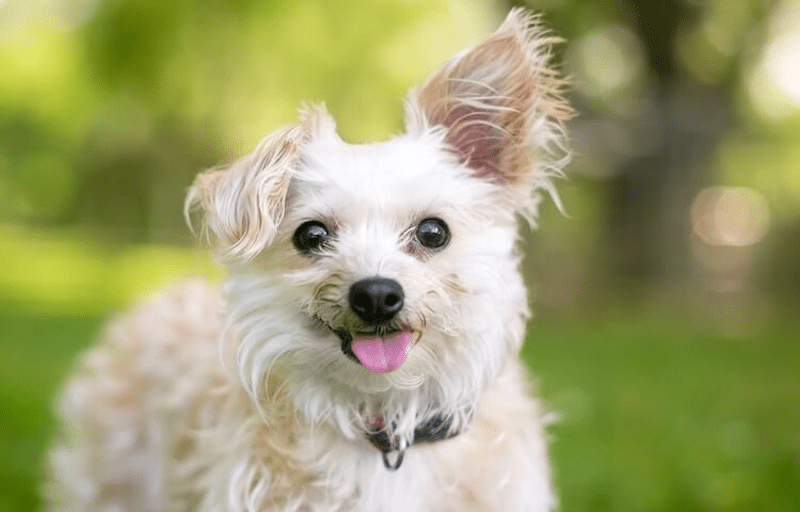
Health Risks
The Yorkipoo is a healthy dog. However, there isn’t much long term data on their health issues as they are a fairly new mixed breed dog.
The average Yorkipoo’s life span is 12 and 15 years.
A reputable breeder will test their parent dogs for genetic health problems. This will result in healthier puppies.
Avoid purchasing from pet stores or backyard breeders as they often don’t test their dogs and your puppy will be at a higher risk to develop costly health problems later in life.
If your Yorkipoo shows any signs of being unwell, take it to your local vet for a check up.
Health Problems
The most common health issues a Yorkipoo faces are those that affect Yorkshire Terriers or Poodles.
Health problems most commonly reported in the Yorkie Poodle mix include:
- Eye problems including dry eye, cataracts, retinal detachment and progressive retinal atrophy. It is recommended breeders get health clearances for their dogs from the Canine Eye Registry Foundation (CERF).
- Joint problems include patellar luxation (dislocating knee caps), hip dysplasia (hip deformity) and Legg Calve Perthes disease (degeneration of the hip joint)
- Collapsing trachea which will result in coughing and breathing problems
- Epilepsy (mild or severe seizures)
- Hypoglycemia (low blood sugar)
- Cardiac problems including endocardiosis and degenerative mitral valve disease
- Endocrine diseases include diabetes, Addison’s disease and Cushing’s syndrome
- Atopic Dermatitis (an inherited skin disease)
- Bloat
- Dental decay
Is a Yorkie Poo a Good Family Dog?
The Yorkipoo makes a great pet. They’re playful, fun and affectionate personality makes them a very popular choice.
They are first and foremost companion dogs and love to spend time with their human family.
Their favourite activities include playing tug-of-war with their soft toys and cuddling on the lounge with you.
They are an inside dog and not suitable to sleep outdoors.
They cannot handle cold weather well and may need to wear a jumper in winter time to stay warm.
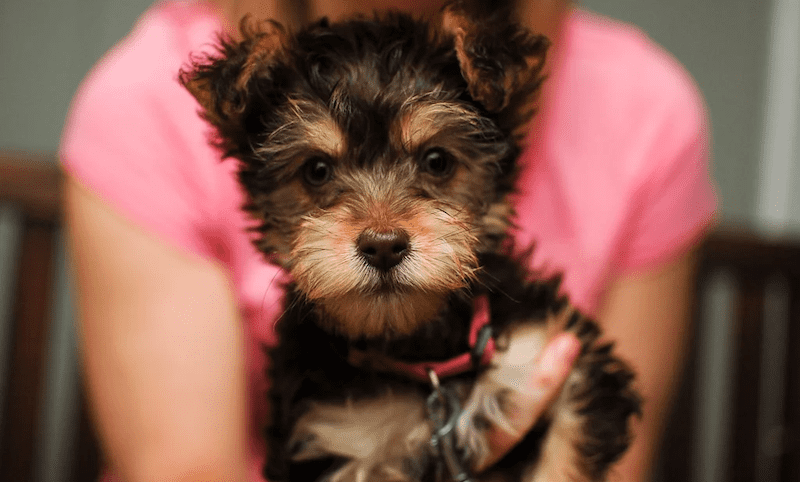
A Yorkipoo can live in an apartment or house with no backyard, as long as you can regularly take them outdoors somewhere to go toilet and to exercise.
They are suitable pets for singles, couples, older people or families with older children.
Their tiny size means they may not be suitable for young children.
They can easily be injured by rough play or handling and also are prone to nipping if they feel threatened.
They will usually get along well with other dogs and other pets if they are socialised from an early age.
Grooming
Because a Yorkie Poodle mix could have silkier Yorkshire Terrier fur or a thicker coat from their Poodle parent, their regular grooming needs may vary.
All Yorkipoos will need regular grooming and brushing at home, to avoid tangles and remove any loose dog hair.
This will also remove dander and decrease the chance of allergic reactions.
If you brush your Yorkipoo from an early age, it should grow to enjoy the attention and bonding time that brushing brings.
It is recommended pet parents bath their Yorkipoo every 6-8 weeks.
Avoid washing too often as this can dry out your pups skin and cause painful skin infections.
If your Yorkipoo’s coat is silkier and straight, you may be able to cut their hair at home yourself when it starts to get too long.
However, if your Yorkipoo has a curly coat from their Poodle parent then it can be difficult to do yourself and may be best to visit a professional groomer.
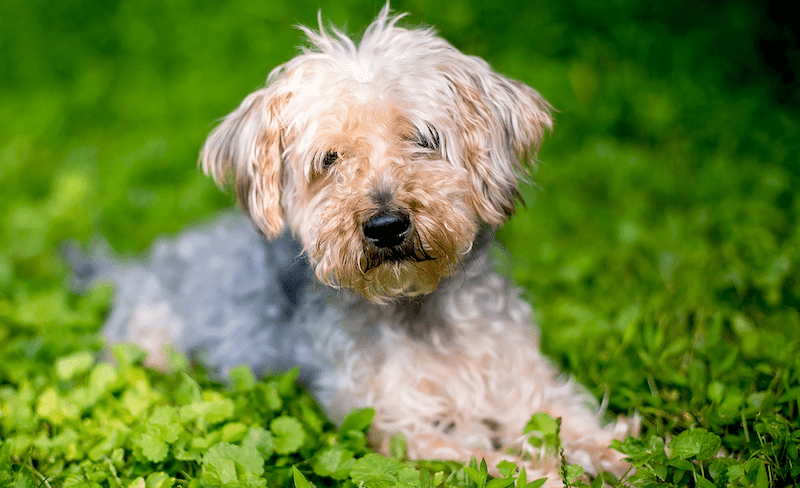
Trim your Yorkipoo’s nails whenever they get too long. Some dogs hate getting their nails cut and refuse to sit still.
This makes it difficult and increases the risk of you hurting their nails by accident.
If this is the case, visit a dog groomer or vet to help clip their nails.
Yorkipoo dogs, like many small breeds, are prone to dental problems.
You can keep their teeth clean by feeding them raw bones, doggy dental treats or brushing their teeth with a dog safe toothbrush and toothpaste.
Diet
Feed your Yorkipoo a diet of high quality dog food.
It can be tempting to buy cheap, supermarket dog food but beware -the cheaper dog foods lack nutrition and can cause more costly vet trips later in their life.
It is ideal to feed your Yorkipoo dry food as this is better for their teeth.
Only feeding them wet food can lead to gum disease and other dental issues later in life.
The Yorkie Poodle mix can be a fussy eater. If your Yorkipoo doesn’t seem keen to eat its dry food, you could mix a spoonful of canned dog food in to make it taste nicer.
It is a good idea to speak to your local vet about what is best to feed your Yorkipoo. Nutrition needs can vary from dog to dog and will also change throughout their life time.
A puppy will have different dietary needs from an adult and a senior dog.
Exercise Requirements
The Yorkie Poodle mix requires daily exercise to stay happy and healthy.
Exercise provides your dog with both mental and physical stimulation.
Their small size means the Yorkipoo doesn’t need as much exercise as larger dogs.
They will need between 20-60 minutes of exercise daily. This can vary depending on your dogs age and physical health.
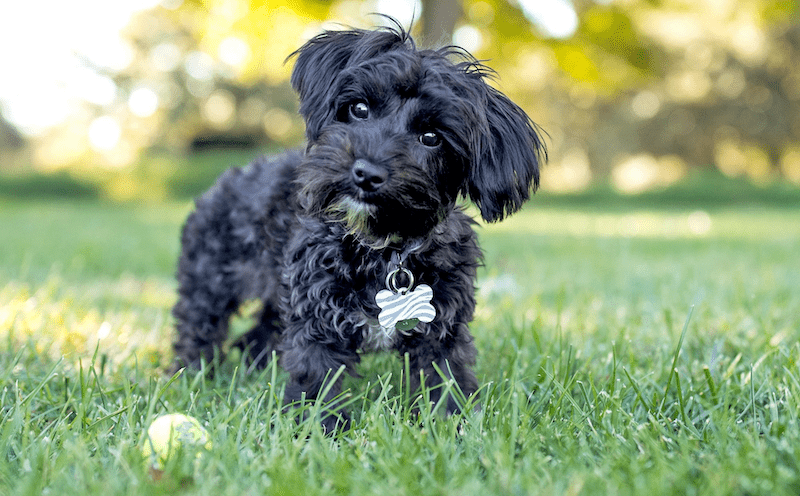
The Yorkipoo is a playful pup. They will often have quick bursts of energy, run around like crazy then crash on their bed for a long nap for the rest of the afternoon.
A quick walk around the block is usually enough to tire your Yorkipoo out, making them a great choice for senior citizens.
Your Yorkipoo will also love playing fetch with a small tennis ball or tug-of-war with their soft toys.
Training
A Yorkie Poodle mix will be eager to please you, making obedience training an easier task. However, they can be stubborn so persistence is key.
It is recommended you use positive reinforcement when training your Yorkipoo.
When it does something right, reward it – this can be with a treat, a pat or praise in a high pitched voice.
Avoid using negative reinforcement or punishment when your Yorkipoo does something wrong.
This is less effective in teaching it anything and more likely to scare it, especially because it is so small.
It is likely to continue the negative behaviour but instead hide try to it from you.
Most Yorkipoos will only ever learn basic commands but if you are dedicated you can also teach your pup more impressive tricks like ‘play dead’ or to balance a treat on its nose.
They can also be trained to work as therapy dogs. Their affectionate and friendly nature makes them a great companion to visit nursing homes and hospitals to cheer up anyone who needs some love.
Your Yorkipoo may develop a prey drive from their Yorkie parent.
Because Yorkshire Terriers were originally bred to hunt rats, modern Yorkies often still have the instinct to chase small creatures.
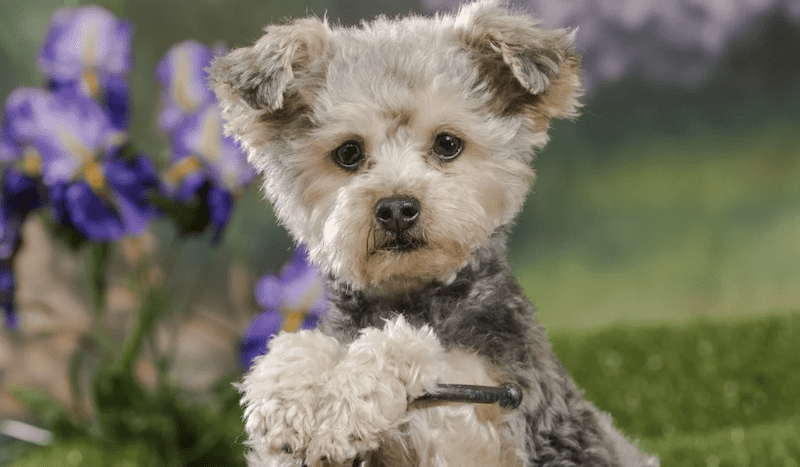
This can cause an issue if they injure a small pet or native wildlife, or if they see something they want to chase and run away from you out in public.
The Yorkipoo hates to be left alone and is prone to developing separation anxiety.
It is important from an early age you leave your Yorkipoo alone sometimes and teach it that it isn’t bad to be by itself.
Start small by leaving it in a room alone for a short period then build up slowly to leaving it alone for longer and longer.
If you don’t do this, your Yorkipoo may become anxious when you leave.
This can lead to excessive barking, destroying things in your house or chewing its feet until they are sore.
Try to give your Yorkipoo something to do when left alone.
Toys that slowly release food can be a great source of entertainment, such as lick mats.
It is recommended you start toilet training your Yorkipoo from day one. Be patient and persistent.
As a puppy, take it outside to go potty every few hours. Also take it out first thing in the morning, after a meal, after playing, after a long nap and right before bed.
Get into a good routine and praise your Yorkipoo when it goes outside to potty without being prompted.
Crate training may also assist with helping your pup to toilet train faster.
Many local vets run puppy preschool classes.
This will help give you advice on training your pup plus also helps socialise your dog.
Do Yorkie Poos Bark A Lot?
The Yorkipoo is a yappy dog that will naturally bark a lot.
This can make them challenging dogs for new owners. The barking can be annoying for both you and your neighbours.
When feeling stessed about their barking, remember that they always mean well.
They are barking because they are excited or to warn you against something they feel unsure about (like a stranger coming to the door).
This can be a positive if you want a watch dog. However, they make awful guard dogs.
They think they are big and tough but in reality are small and unable to defend you.
The most common reasons problem barking occurs is when a dog in experiencing separation anxiety or exposed to something scary (like another dog or a stranger).
These can be prevented with proper training and socialisation from an early age.
Yorkipoo’s for Sale
Are you thinking about welcoming a Yorkipoo into your family? How exciting!
Check out our tips for purchasing a Yorkie Poodle mix below.
Where to Buy and Price
Yorkipoo’s are hard to find in Australia as they are a relatively new toy breed and there are very few breeders.
This will likely make them more expensive than other dogs.
When buying a dog, remember there is more than just the initial cost of purchasing your Yorkipoo.
Across the dog’s life span, ongoing costs will include food, grooming and monthly parasite protection treatments.
Set up costs will include a bed, crate, kennel, collar, leash and toys.
We also recommend you get pet insurance or set aside some emergency money for vet bills, as these can arise unexpectedly and be very costly.
Buying a Yorkipoo Puppy
Yorkipoo puppies are adorable, tiny and impossible not to fall in love with! Hold one in your arms and you won’t be able to say no.
Because of their tiny size, Yorkipoo puppies are especially fragile.
Something as simple as accidentally tripping over your baby Yorkipoo or handling it a bit rough could severely injure it.
Be extra careful and gentle when handling your new puppy.
Buying a Yorkipoo as a puppy gives you the option to get the pup when you want it and to choose the gender and colour you prefer.
We recommend purchasing puppies from experienced and reputable breeders.
They will produce a well bred dog that will be healthier and happier across their life span.
A good breeder will do genetic testing on the puppy’s parents to detect and prevent them passing on diseases to your pup.
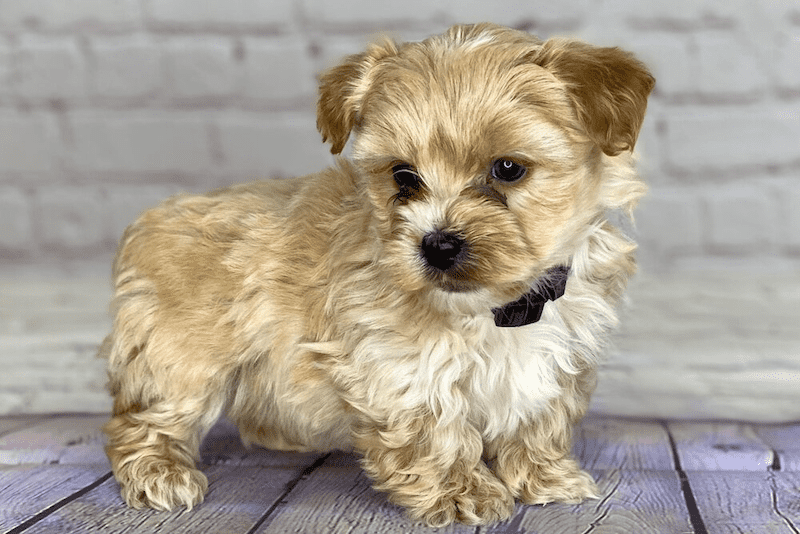
Make sure you avoid buying a puppy from an irresponsible or inexperienced source.
A backyard breeder or pet store is less likely to test the parent breeds for health issues, resulting in sick puppies from combined genetic problems.
Pet stores also may source their puppies from puppy mills, who will over breed their dogs in inhumane conditions.
Some countries have puppy lemon laws which protect the consumer if their puppy becomes ill shortly after they purchase it.
Do lots of research before choosing a breeder to make sure they are responsible and you feel comfortable with them.
Ask lots of questions and ask to see the parent dogs. A good breeder will happily discuss the pups with you and answer any concerns.
They may also ask questions about you and your home to make sure their beloved puppies are being sent to a good environment.
Beware buying puppies online. Scam websites will advertise dogs that don’t exist then steal your money.
While most reputable breeders will advertise online, they won’t ever ask you for credit card information over the internet.
Red flags include a website with puppies constantly available, having multiple designer dog breeds and having no phone number listed to contact them.
Adopting an Adult Dog
Adopting an adult Yorkipoo is a great way to give an older dog a second chance at a loving family.
Adult dogs can be adopted from animal shelters or rescue groups.
You can find these organisations by searching online, on social media or by asking local vets for recommendations.
Because Yorkipoo’s are quite rare in Australia, it will be unlikely you will find a rescue one to adopt.
And if one does become available, it will likely be snatched up quick.
If you are looking to adopt a Yorkipoo or similar, it is best to contact Yorkshire Terrier or Poodle rescues, who specialise in rescuing those breeds.
There are also groups who specialise in rescuing toy breeds.
Adopting an adult Poodle mix will usually cost around $500.
This fee will typically include the dog being checked by a vet, micro-chipped and desexed.
Related Articles
Shih Poo Dog Breeds
References
www.petguide.com/breeds/dog/yorkie-poo/s
www.dailypaws.com/dogs-puppies/dog-breeds/yorkie-poo



